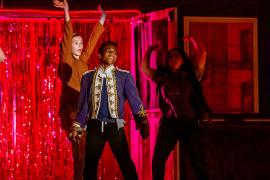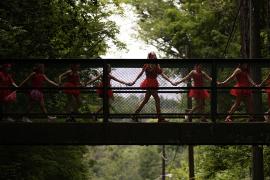Ben was the boy in the boat. A gregarious go-getter whose journey through camp — and to adulthood — was inextricably linked to sailboats on the water. The lessons he learned at camp originated from, or were reinforced by, the challenges he faced as a skipper, navigating uncertain and constantly shifting conditions having to do with wind, tide, crew, and competition. Lessons about self-reliance, self-confidence, exploration, respect, and responsibility — all important metrics of a successful summer camp experience and harbingers of what follows.
That those very life lessons intrinsic in the summer camp experience relate directly to self-definition makes them all the more meaningful in the grander landscape of personal growth and the march toward adulthood.
Forging Identity at Summer Camp
Suddenly equipped to think abstractly (or to think about thinking, to put it another way), young teens begin to grapple with the question "Who am I?" and, just as important, "Who do I want to be?" As with many questions, these are easier asked than answered. Nevertheless, one thing is clear: camp provides many opportunities for young people to "try out" different roles and relationships — important steps on the way to recognizing whom they are and to becoming what they can be.
Among the most critical of these relationships are the ones they have with their counselors. Close enough in age to "relate," yet old enough to be looked up to by kids as mentors and critical commentators on the choices they make and the paths they take, counselors provide an important feedback loop in the developmental dance. To paraphrase psychologist Erik Erikson, to experience wholeness, young people must feel continuity between how they think of themselves and how they believe others think of them. It is really this commonality and consistency of self-image that helps teens figure out their identity.
Perhaps more to the point, counselors serve as role models, helping teens to pick and choose qualities they wish to incorporate into their own developing identities. Awareness of this process dates all the way back to Sigmund Freud, who maintained that identity attainment results from a process by which an individual incorporates the characteristics of another person. He said that identification is "invariably based on an emotional tie with an object (Erickson 1968)," often a parent. It's likely that Freud would count "summer parents" as well.
Finally, the identity is reaffirmed by finding, or more likely realizing, that a particular environment fits! In the words of psychologist William James, as quoted by Erickson, "At such moments there is a voice inside which speaks and says: ‘This is the real me! (Erickson 1968)'" Or, as Lauren, 17, puts it, "The camp environment, including my camp friends, defines who I am."
The Boy in the Boat
Ben first came to camp in the summer of 2000, immediately establishing himself as an active, popular member of our community. He engaged in an impressive array of activities, was (reportedly) always well-behaved, and — even at his young age — was already pegged as a leader.
Ben's search for meaning and manhood played out before my eyes as I witnessed firsthand his evolution from the nine-yearold his counselor described as "cool" to the seventeen-year-old who received our camp's highest honor on what may very well have been his final night of childhood. Indeed, it was at camp that Ben found what he would later describe as the preparation to live independently and the ability to build close relationships. He also grew to appreciate the value of a community where people care about one another.
There is no question that Ben's identity, independence, and quality of character — partially forged at camp — aid him in his quest to be a highly successful and contributing member of his community and broader society.
And his counselors helped make it so.
Perspectives on Five Metrics of Success
Self-Reliance
SW: Developmental dictates during adolescence steer young people away from dependence on their parents and toward independence and self-reliance. In psychological terms, it's called developing an "internal" as opposed to "external" locus of control — meaning that what formerly was other-directed ("Do this"; "Don't do that") is now self-directed ("I should do this" and "I shouldn't do that"). Shorn of long-established support systems, kids at camp must identify the resources that can help them meet personal and group goals, resolve conflicts, and find success.
Tip: Counselors help young people become self-reliant by encouraging them to make positive choices, solve problems, and accept responsibility for personal behavior.
BS: When my parents' SUV moved out of sight, I was for the first time in my nine years of life on my own. It didn't hit me right away that the next morning my mom wouldn't be there to wake me up, my dad to help me sail, or even that I wouldn't come home at the end of the day to find my bed nicely made. My camp counselors introduced me to something new: adults who would show me the way but not hold my hand the entire time.
During my first summer at camp, I did a lot of active learning. I would always try something the first time and if I couldn't figure it out on my own, my counselors would be there for guidance. The level of involvement a counselor should have with a camper is difficult to determine, as it surely differs from camper to camper. The most important thing is that counselors find the balance between guidance and "handholding." If counselors provide just basic guidance, a child may not learn a new skill or understand a new concept. On the flip side, if a counselor is too involved, the camper will inadvertently learn to depend on him or her for everything. Yes, a counselor's main duty is to serve as a support and help promote a camper's growth, but too much direction can result in a backtracking effect.
Self-Confidence
SW: For campers, becoming self-reliant is predicated on having the self-confidence to succeed educationally and socially. In turn, self-confidence is born of a positive sense of oneself. Self-esteem is formed primarily in two ways: the experiences one has (and one's evaluation of those experiences) and how closely one's achievements match one's expectations. Campers gain self-confidence when they find meaningful, fulfilling educational and social experiences at camp, interpret those experiences correctly, and have reasonable, achievable expectations for success.
Tip: Counselors help young people become self-confident by helping them to establish realistic goals for achievement and to feel accepted, successful, and influential.
BS: At my summer camp of nine years, the entire camp would gather in the morning six days a week for an assembly. Among other things, awards earned in activities were handed out. The department head of the activity would stand onstage and read out the names of those campers who had achieved a certain level of success. Although many awards were handed out each day, each camper had his or her name read aloud and walked onstage to the sound of applause. In retrospect, I realized this simple act served a much greater purpose than just handing out certificates. Publicly recognizing a camper for his or her accomplishments builds self-confidence. At a general activities camp, perhaps unlike a sports or arts camp, it is not essential for campers to become the best at whatever they choose to do, but it is essential that they feel they've accomplished something. One way camps — and counselors — foster this feeling is by recognizing all campers for what they do.
This society has become a very competitive one. Part of the beauty of camp and camp activities is that progress is not how you match up to a fellow camper. When camp staff set skill levels for kids to work toward, campers can see their progress and continue to build self-confidence. This newfound confidence is not only applied to the activity in which the campers are excelling but also to the camp experience as a whole. And that will likely be apparent when they return home.
Exploration
SW: Camp is, in short, about learning: learning about oneself, learning about others, and learning about new ways to approach the world. Self-confidence leads to learning through exploration of one's interests, abilities, and relationships. To maximize exploration, young people need to feel safe — free from fear of ridicule, sarcasm, or insult. Creating a community of caring where young people feel comfortable moving beyond their "comfort zone" to the "challenge zone" promotes exploration.
Tip: Counselors can help young people explore by encouraging them to embrace opportunities to try new things, meet new people, and accept failure as part of growth.
BS: My counselors were always pushing me. Pushing me during unit games, pushing me in the cabin towards new activities, pushing me to be a better sailor, and pushing me towards girls at dances. Looking back on it all, I realize that not all of my counselors knew what was best for me, but in their own ways they encouraged me to step outside of my comfort zone and take a risk. As children begin to grow up and move into adolescence, they experience a similar push from their peers. Outside pressure can have both negative and positive effects. But the biggest difference between the encouragement of a counselor and that of a peer is what occurs after the risk is taken. If one of my peers saw me, say at age ten, ask a girl to dance and get rejected, he would probably make fun of me. Even though his jokes wouldn't be ill intended, they would make me think twice before getting the courage to ask another girl to a dance. A counselor, on the other hand, needs to be able to congratulate his or her campers when the risks turn out successful but also support them if they fail.
Over the summer a counselor will undoubtedly become friends with the campers, but it is important to remember that you are still an adult figure in the campers' lives and your actions are taken more to heart than those of their peers.
For the most part, my counselors supported me no matter the outcome. I developed a trust with them and in turn with the entire camp community. Whether I was on the water, on a field, or in my cabin, I always had this feeling that my counselors and the camp would always "have my back."
Respect
SW: A necessary component of identity formation in adolescence is recognizing not only one's uniqueness relative to others, but also one's similarities — and how one fits into the larger whole of a social system, be it family, camp, school, community, or society at large. Fitting in well means developing, and sustaining, a genuine respect for oneself, for others, and for the basic tenets, or rules, that govern conduct: those that are self-imposed and ones that are generated by others — in this case the institution of camp.
Tip: Counselors can help young people develop respect by noting the assets each young person brings to the camp community, building trust among campers and staff, and demonstrating an understanding of and appreciation for camp rules.
BS: Having been both a camper and an assistant counselor, I have come to respect my counselors and gain the respect of my campers. During this past summer, I experienced both. I had a counselor who was well liked, talented, funny, helpful, and fair. He naturally commanded — and deserved — all the respect he received. What was most apparent was that he didn't consciously make an effort to be, well, the man; he just was.
As an assistant counselor, I tried to emulate some of my previous counselors. I did the things that I remembered as cool or something that I had looked up to. I soon realized that by going beyond merely watching your campers and instead becoming a part of their lives, you gain their respect. It's also important to remember that kids are used to being the center of attention among adults who surround them at home, especially their parents. At camp, it's different. Now they are just one of a number of kids counselors must tend to and are responsible for. One of the things that make being a counselor so exciting — and at times so difficult — is realizing no two campers are the same. It's important to recognize what each camper brings to the cabin, the group, and the camp. This distinction helps campers set a sturdier base for themselves in the camp community.
The same concept applies to camp activities. In sailing, for example, I always feel comfortable being the skipper, even in rough weather. When fellow counselors gave the tiller to me during these situations, it made me feel needed — and respected.
Responsibility
SW: Beyond the buddies, baseballs, and bonfires lies the true value of the summer camp experience: a heightened sense of personal responsibility for the well-being of others. That "other orientation" manifests itself in many ways, including a strong sense of connectedness and a commitment to give of oneself. Indeed, Teens Today research from SADD (Students Against Destructive Decisions) points out that young people who have attended summer camp are significantly more likely than those who have not to feel good about their relationships and to take positive risks, such as volunteering for community service.
Tip: Counselors can help young people become responsible and contributing members of the community by modeling true friendship (in words and in deeds) and the principle of service to others.
BS: I met some of the greatest people in the world at camp. In fact, I made such real friendships that the time I spent at camp each summer was enough to make me feel good the entire year. Like many campers, I have made friends with people from all over the country, and I intend to stay close with them for a long, long time. When you think about it, camp is the perfect place to make strong friendships . . . there's no stress, everyone's in a good mood, and you spend your days doing things you like, such as sailing in my case.
The way my counselors acted toward their campers and fellow counselors impacted the way I viewed friendship. The counselors worked well with one another, so I worked well with my bunkmates. The counselors joked around, so I joked around. The list goes on, but my point is that my counselors helped teach me about "being there" for your friends. I have yet to feel a stronger sense of brotherhood than I did at camp. There was just this imprinted feeling I had that I needed to support my cabin mates in anything and everything. That's one of many lifelong things I learned at camp: a conscious responsibility to always be there for my friends and for others. Away from camp, I have volunteered as a peer leader, facilitating discussions about alcohol and drug use with middle and high school students and their parents, and I have joined fellow athletes in performing community service.
Life Lessons Learned at Camp
The benefits to young people of a summer at camp have long been discussed and more recently evaluated. What are they? Simply put, they are opportunities. Opportunities not exclusive to camps but rather concentrated at camp, where under the direction, supervision, and influence of caring counselors, young adults can learn to become more independent, more confident, more self-aware, and more giving toward others. Their identities emerge, solidify, and are reinforced by recognition of their character and contributions.
In defining character and contributions, pediatrician and author Eli Newberger talks about environments that stress ability, responsibility, and the values of honesty, hard work, and positive action to benefit others. Such is the environment of summer camp. And thus is the importance of those who work there.
References
Erikson, E. (1968). Identity: Youth and Crisis. Norton. New York, New York.
Newberger, E. H. (1999). The Men They Will Become: The Nature and Nurture of Male Character. Da Capo; Perseus Books Group. Cambridge, Massachusetts.
Wallace, S. (2008). Reality Gap. Union Square Press; Sterling Publishing. New York, New York.
Stephen Wallace, M.S. Ed., author of the new book Reality Gap — Alcohol, Drugs, and Sex: What Parents Don't Know and Teens Aren't Telling, has broad experience as a school psychologist and adolescent counselor. He serves as chairman and CEO of SADD, director of counseling and counselor training at the Cape Cod Sea Camps, and adjunct professor of psychology at Mount Ida College. For more information about Stephen's work, visit www.stephengraywallace.com.
Ben Seifer is a scholar, athlete, and newspaper columnist and editor at Newton South High School in Massachusetts. Among his many accomplishments, he has served as captain of the varsity Alpine Ski Team, a peer educator, and community-service volunteer. In August 2008, Ben graduated from the Cape Cod Sea Camps' Counselor Training Program and received the Service Cup for his integrity and selfless contributions to the welfare of others. Ben will be attending The George Washington University in the fall.
© Summit Communications Management Corporation 2009 All Rights Reserved
Originally published in the 2009 May/June issue of Camping Magazine.




